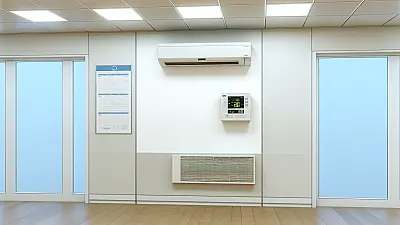HONOLULU, HI - Federal inspectors identified serious safety violations at Kuakini Geriatric Care, Inc., including improper oxygen therapy management for critically ill residents and dishwashing procedures that put all residents at risk for foodborne illness during a January 8, 2025 inspection.

Critical Oxygen Therapy Management Failures
The inspection revealed systematic failures in managing oxygen therapy for residents with severe respiratory conditions. Inspectors documented three separate cases where oxygen equipment was improperly maintained or monitored, creating potential life-threatening situations for vulnerable residents.
In the first case, a resident with chronic obstructive pulmonary disease (COPD) requiring continuous oxygen at 2 liters per minute was found with oxygen tubing that lacked proper dating labels. The resident told inspectors that "staff changes it out when she asks them to, when it gets dirty or wet inside the tubing," indicating the facility relied on residents to request necessary equipment changes rather than following established medical protocols.
A second resident requiring oxygen through a trachea collar was discovered with completely unlabeled tubing despite facility policies requiring daily equipment changes. This resident had respiratory failure and required tracheostomy care, making proper oxygen delivery equipment essential for survival.
The most concerning case involved a resident on droplet precautions for respiratory syncytial virus (RSV) who was found with his oxygen completely turned off. When a registered nurse was questioned about the oxygen concentration, she discovered "it's not on, but it's supposed to be at 2 L" and had to turn the equipment back on. The tubing for this critically ill resident also lacked required dating labels.
Medical Significance of Oxygen Therapy Violations
Proper oxygen therapy management is fundamental to respiratory care in nursing facilities. Residents requiring continuous oxygen typically have severe lung conditions such as COPD, emphysema, or respiratory failure, where even brief interruptions in oxygen delivery can cause dangerous drops in blood oxygen levels.
The facility's own respiratory policy clearly states that nasal cannulas should be changed weekly and when soiled, with proper documentation through dating labels. For trachea collar equipment, the policy requires daily changes. These requirements exist because contaminated or improperly functioning oxygen equipment can introduce bacteria into vulnerable respiratory systems, potentially causing life-threatening infections.
When oxygen delivery equipment is not properly tracked and changed according to medical standards, several serious complications can occur. Dirty or contaminated tubing can harbor harmful bacteria and fungi that can cause pneumonia or other respiratory infections. For residents with compromised immune systems or existing respiratory conditions, such infections can be fatal.
The discovery of completely turned-off oxygen equipment represents an immediate threat to resident safety. Residents with severe respiratory conditions can experience rapid deterioration in blood oxygen levels, leading to organ damage, cognitive impairment, or death within minutes of oxygen deprivation.
Dishwashing Safety Creates Immediate Jeopardy
Inspectors identified an immediate jeopardy violation in the facility's dishwashing procedures that put all residents and staff at risk for foodborne illness. The inspection found that kitchen staff were not ensuring water temperatures reached the required 180 degrees Fahrenheit during the final rinse cycle before processing dishes through the conveyor belt system.
This violation was classified as immediate jeopardy because improper dishwashing creates an immediate risk of foodborne illness for the entire facility population. Nursing home residents are particularly vulnerable to foodborne pathogens due to weakened immune systems, chronic medical conditions, and medications that can compromise their ability to fight infections.
Professional food safety standards require specific water temperatures during dishwashing to eliminate harmful bacteria, viruses, and other pathogens that can cause serious illness. When dishes and silverware are not properly heat sanitized, dangerous microorganisms can survive and be transmitted to residents through contaminated eating utensils and dishware.
The consequences of foodborne illness in nursing home populations can be severe, including severe dehydration, hospitalization, and death. Outbreaks of foodborne illness in long-term care facilities have historically resulted in multiple deaths and significant health complications among vulnerable residents.
Industry Standards and Required Protocols
Federal regulations require nursing facilities to follow established infection control protocols for both medical equipment and food service operations. For oxygen therapy equipment, facilities must implement systematic tracking and replacement schedules to ensure equipment remains sterile and functional.
Proper oxygen therapy management requires nursing staff to monitor equipment functionality, maintain clean and properly dated tubing, and ensure continuous delivery as prescribed by physicians. The facility's failure to implement these basic safety measures violated fundamental standards of respiratory care.
Food service operations in nursing facilities must comply with professional standards that include proper dishwashing temperatures, equipment monitoring, and staff training. The immediate jeopardy classification indicates that the violations posed such a serious threat to resident safety that immediate corrective action was required.
Facility Response and Corrective Measures
The Director of Nursing confirmed during interviews that oxygen tubing should be changed weekly by nursing staff and properly labeled with dates. She acknowledged that both nasal cannula tubing and sterile water bottles should have had dates on them, indicating awareness of the proper procedures that were not being followed.
When questioned about dishwashing procedures, facility staff were required to demonstrate understanding of proper water temperature requirements and implement immediate changes to ensure compliance with food safety standards.
Additional Issues Identified
The inspection also revealed that the facility's comprehensive care planning process was not adequately addressing the specific needs of residents requiring complex respiratory care. Proper care planning should include detailed protocols for oxygen equipment maintenance, monitoring schedules, and staff responsibilities for ensuring continuous compliance with safety standards.
The violations documented during this inspection highlight the critical importance of systematic quality assurance programs in nursing facilities, particularly for residents with complex medical needs requiring specialized equipment and careful monitoring.
Full Inspection Report
The details above represent a summary of key findings. View the complete inspection report for Kuakini Geriatric Care, Inc from 2025-01-08 including all violations, facility responses, and corrective action plans.
💬 Join the Discussion
Comments are moderated. Please keep discussions respectful and relevant to nursing home care quality.